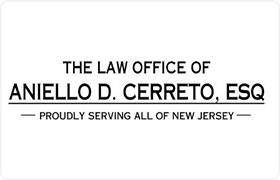Helmetta Divorce & Family Law Lawyer, New Jersey
Sponsored Law Firm
-
 x
x

Click For More Info:
-
The Law Office of Aniello D. Cerreto, Esq.
215 Gordon's Corner Road Suite 1 Manalapan, NJ 07726» view mapDivorce & Family Law A Lawyer Who Listens To You
When you need an attorney, you need an advocate who takes the time to understand your case.
800-809-4531
Jeffrey Goldblatt
✓ VERIFIEDDivorce & Family Law, Divorce, Traffic, Real Estate
With over thirty years of experience, attorney Jeffrey W. Goldblatt is dedicated to providing vigorous and aggressive representation to clients in a v... (more)
Irwin D. Tubman
✓ VERIFIEDEstate, Divorce & Family Law, Real Estate
Attorney Irwin D. Tubman has been helping New Jersey clients resolve difficult legal problems for more than 35 years. Mr. Tubman believes that info... (more)
Barnett E. Hoffman
Arbitration, Collaborative Law, Alimony & Spousal Support, Corporate
Status: In Good Standing
Rosalind Westlake
Adoption, Corporate, Business Organization, Commercial Leasing
Status: In Good Standing
Jeffrey Brown
Adoption, Property & Casualty, Bankruptcy & Debt, Residential Real Estate, Child Support
Status: In Good Standing Licensed: 26 Years
James Franklin Gellman
Divorce & Family Law, Child Custody, Child Support, Prenuptial Agreements
Status: In Good Standing Licensed: 37 Years
Jeffrey Brown
Adoption, Property & Casualty, Bankruptcy & Debt, Residential Real Estate, Child Support
Maria Michele Plinio
Lawsuit & Dispute, Estate, Divorce & Family Law, Accident & Injury
Status: In Good Standing Licensed: 37 Years
 Aniello Cerreto Manalapan, NJ
Aniello Cerreto Manalapan, NJ AboutThe Law Office of Aniello D. Cerreto, Esq.
AboutThe Law Office of Aniello D. Cerreto, Esq. Practice AreasExpertise
Practice AreasExpertise



